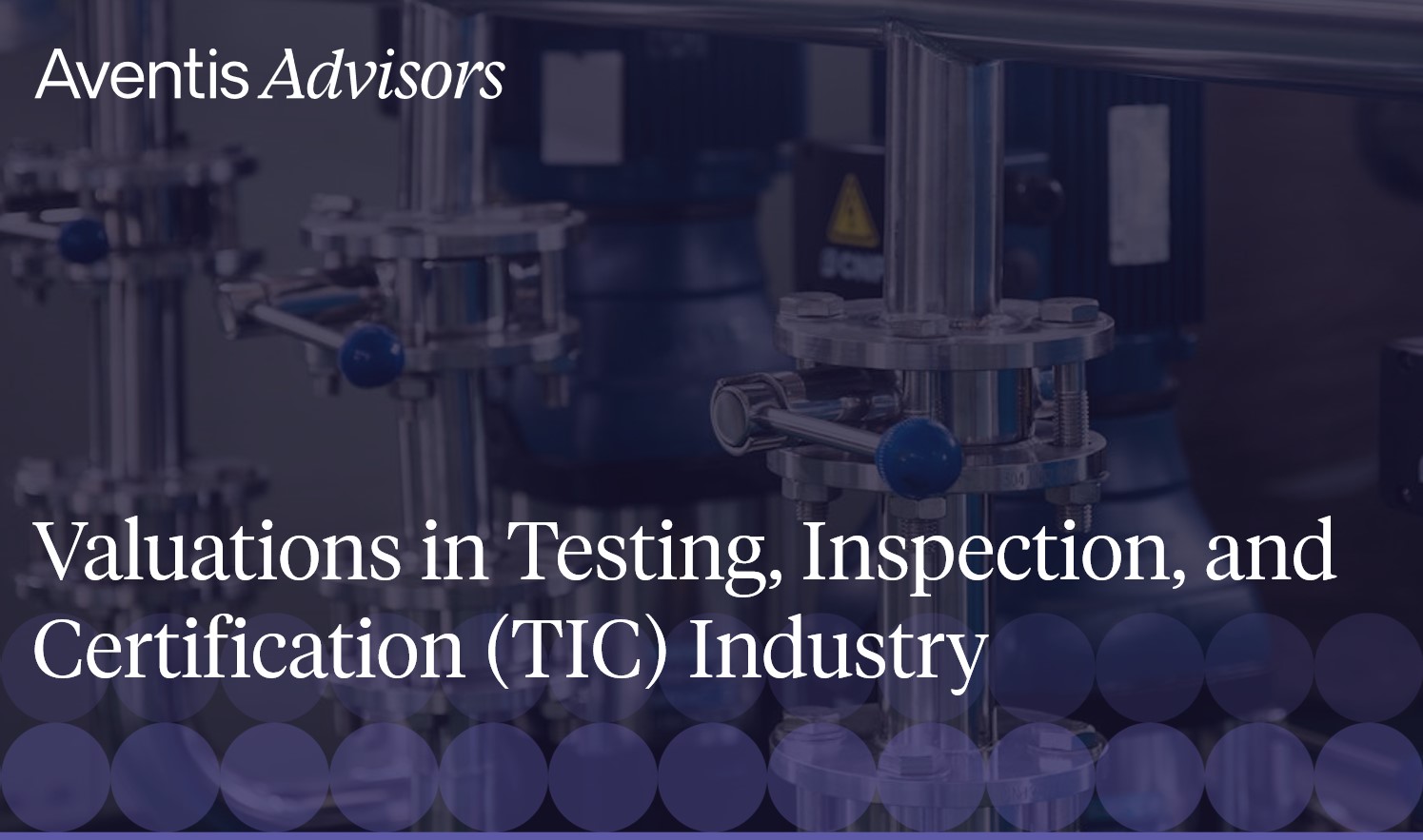Testing, Inspection & Certification (TIC) underpins modern commerce by ensuring products and processes meet essential quality and safety standards. According to Bureau Veritas’ estimates, every battery pack, wind-turbine blade, and children’s toy requires independent verification before it reaches the market, creating a sector valued at more than €200 bn. Moreover, the TIC industry currently sees only 40% of this market outsourced to private providers. The remaining 60% remains in government laboratories and in-house teams, representing a significant opportunity as regulation, risk-transfer needs, and technology evolve.
Demand is driven by the electrification of transport and power systems, tighter regulatory oversight in life sciences, and increasing ESG requirements. At the same time, drones, IoT sensors, and AI-driven audit trails drive down costs and expand the scope of services, according to Bureau Veritas. These trends explain why leaders like SGS, Bureau Veritas, and numerous private-equity platforms have completed hundreds of bolt-on acquisitions to secure specialized capabilities and accelerate their growth.
In this report you will find a detailed mapping of market size by end-market, an analysis of competitive dynamics and valuations, and a strategic playbook for anyone considering M&A activity in TIC. Use the sections that follow to identify the most attractive segments, assess valuation drivers and shape your next deal.
Valuations of TIC Companies
Key Takeaways
The TIC industry encompasses testing, inspection, and certification services that ensure regulatory compliance across virtually every sector of the global economy. With projected average growth at a 4.7% CAGR through 2030, the certification market represents one of the most stable and essential service sectors worldwide.
- €200 bn+ total market (Bureau Veritas estimate) with only 40% currently outsourced, leaving a €120 bn insourced opportunity as regulations and risk-transfer needs evolve.
- Revenue growth, not margins, drives valuation — every 10% of two-year top-line CAGR typically adds ~2.9x to EV/EBITDA multiples.
- Digital transformation and ESG services (drones, IoT sensors, AI audit trails, sustainability certifications) are reshaping delivery models and unlocking new high-value niches.
Table of contents
- What is the TIC industry
- Market size and growth projections
- TIC industry subsectors breakdown
- Major market players and consolidation
- Valuation and financial metrics
- Service type segmentation
- About Aventis Advisors
What is the TIC industry
The TIC industry represents three interconnected but distinct activities forming the foundation of global quality assurance and risk management. According to ISO/IEC 17000 standards:
- Testing involves determining the characteristics of products, materials, or systems using specified procedures and methodologies.
- Inspection focuses on examining products, processes, or installations to verify conformity with predetermined requirements, safety regulations, and quality standards.
- Certification represents third-party attestation that products, systems, or organizations conform to specific requirements.
The development of testing and certification services dates back to the early 20th century, with rapid evolution after World War II. The GATT framework established in 1947 introduced standardized approaches to international trade, making conformity assessment essential for cross-border commerce.
Today’s TIC services enable international trade by providing recognized proof of compliance, facilitating market entry, and minimizing risks associated with non-compliance. This mission-critical function ensures operational continuity across global supply chains while supporting the complex regulatory requirements governing modern commerce.
Market size and growth projections
The global Testing, Inspection and Certification (TIC) market is estimated to be worth more than €200 bn, based on Bureau Veritas’ methodology, which calculates TIC intensity across various industries by multiplying end-user spending by the depth of testing and certification requirements.
However, only 40% of this market is currently accessible to private-sector providers. The remaining 60% is either government-operated or insourced within large organizations. This means the true outsourced market size is closer to €80 bn, creating a clear long-term opportunity for operators who can win contracts from public bodies or offer compelling outsourcing propositions to industrial clients.
Growth projections vary depending on the forecasting source, with expected compound annual growth rates (CAGR) ranging from 3.4% (MarketsandMarkets) to 6.3% (VynZ Research) through 2030. This spread reflects differing assumptions about regulatory tightening, infrastructure investment, and the pace of private-sector outsourcing.
Despite being a mature industry in many regions, TIC continues to grow steadily due to its essential role in enabling trade, supporting compliance, and protecting end users across critical sectors—from electric vehicles and pharmaceuticals to construction and consumer goods. The combination of regulatory complexity, global supply chains, and rising demand for third-party validation ensures that TIC remains a resilient and increasingly valuable service category.
TIC industry subsectors breakdown
The TIC market spans various industries, each with its own regulatory complexity, testing protocols, and growth trajectory. The chart below segments the €200+ bn global market by subsector size, providing a clear view of where TIC services are most embedded—and where strategic opportunities exist.
Top-tier subsectors include Consumer Goods & Retail and Food & Agriculture, each contributing €23 bn or 12% of total market value. Oil & Gas, Construction, and Chemicals follow closely behind at around €19-20 bn (10% each), highlighting the importance of traditional infrastructure-heavy sectors.
Meanwhile, the mid-market tier—Metals & Minerals, Industrial Goods, Transport, Automotive, and Power & Utilities—collectively represents over 35% of the market and is characterized by increasing digitalization, supply chain globalization, and rising demand for third-party certification.
Below are selected subsectors that illustrate how TIC services are evolving across key verticals:
Consumer Goods & Retail (€23 bn, 12%)
This is the largest single TIC segment by market value, driven by the sheer diversity of consumer products and rising regulatory pressure on product safety, labeling, and sustainability.
- Growth is underpinned by global e-commerce, as online platforms introduce their own quality thresholds for marketplace listings.
- Retailers increasingly require certified supply chain documentation to mitigate risk and meet both legal and consumer transparency standards.
- TIC demand is expanding beyond traditional product testing to include claims verification (e.g. organic, cruelty-free, carbon neutral) and real-time factory audits, often in response to ESG reporting mandates.
Food & Agriculture (€23 bn, 12%)
Food safety, traceability, and ethical sourcing are turning this into a fast-evolving TIC frontier.
- The segment is growing, fueled by increasingly complex supply chains and greater public awareness around health, allergens, and contaminants.
- Technologies like DNA-based pathogen detection and blockchain tracking are being integrated into modern food safety systems.
- Certification for organic, sustainable, and fair-trade practices is becoming a commercial necessity, especially in export-driven economies and for retailers targeting premium consumers.
Oil & Gas (€20 bn, 10%)
Despite long-term decarbonization trends, Oil & Gas remains a critical and regulation-heavy vertical for TIC services.
- Core services include pipeline integrity inspection, refinery safety audits, materials testing, and emissions monitoring.
- The shift toward lower-carbon fuels and carbon capture is introducing new compliance areas and verification frameworks, often requiring specialized providers.
- In high-risk environments, certification of safety systems, corrosion control, and emergency response protocols remains mandatory, supporting stable long-term demand.
Construction (€19 bn, 10%)
Construction TIC is powered by both infrastructure expansion in emerging markets and retrofits and safety upgrades in developed economies.
With public infrastructure spending accelerating globally, and ESG-linked building certifications gaining traction, construction TIC is expected to remain a major and evolving revenue stream.
Services include materials testing, structural integrity inspections, fire safety certification, and seismic compliance checks.
Digitalization is opening new frontiers, such as drone-enabled site inspection, 3D modeling validation, and predictive maintenance audits.
Major market players and consolidation
The TIC industry remains fragmented despite the presence of several large multinational players. The chart below highlights the top 10 global TIC providers by revenue and headcount, offering a snapshot of current scale and strategic positioning.
Global Leaders by Scale and Acquisition Activity
- SGS (Switzerland) remains the undisputed global leader with $7.72 bn in revenue and nearly 100,000 employees. With 97 acquisitions since 2014, it has built unmatched breadth across industries and geographies.
- Eurofins Scientific (Luxembourg), with $7.52 bn in revenue and 63,000 staff, is the most aggressive consolidator, having completed 378 acquisitions since 2015, primarily in life sciences, food safety, and environmental testing.
- Bureau Veritas (France), with 84,000 employees and $6.98 bn in revenue, has also built a strong global platform, focused on compliance, construction, and marine sectors, supported by 61 acquisitions between 2014 and 2024.
Notable Regional and Specialist Players
- Intertek (UK) and DEKRA (Germany) both generate over $4 bn in revenue with headcounts of around 45,000. Intertek’s strength lies in consumer product testing, while DEKRA focuses on automotive, industrial inspection, and safety.
- UL Solutions (US) and DNV (Norway) specialize in electrical safety, ESG, and energy infrastructure certification. While smaller in revenue (~$3 bn), they play an outsized role in key technical segments.
- Applus+ (Spain) and TÜV SÜD / TÜV Rheinland (Germany) operate regionally but hold global relevance in automotive, heavy industry, and process safety. Applus+, in particular, has drawn PE interest as a platform acquisition.
M&A Activity and Consolidation Trends
The fragmented nature of the TIC industry continues to fuel high levels of strategic and financial M&A:
- Strategic acquirers focus on expanding into high-growth verticals (e.g., EVs, renewables, ESG compliance) or securing niche technical capabilities that unlock new sectors or geographies.
- Private equity firms have widely adopted buy-and-build strategies, attracted by predictable cash flows, high renewal rates, and recession-resistant demand. Platform acquisitions are often followed by bolt-ons that deepen specialization or broaden service scope.
- The increasing complexity of global regulatory frameworks has elevated the value of providers with integrated, multi-jurisdictional capabilities—especially those that can offer bundled testing, inspection, and certification services at scale.
- As a result, valuations are highest for firms combining double-digit revenue growth with specialized capabilities, strong client retention, and exposure to regulated or mission-critical sectors.
Strategic Implication
For industry entrants or consolidators, the competitive landscape offers two clear paths:
- Specialize in a high-growth niche (e.g., EV battery validation, AI model safety audits, ESG certification).
- Or build horizontal scale through acquisitions, focusing on operational efficiency, global reach, and cross-selling potential.
Either way, depth of expertise, digital readiness, and international coverage will define the next wave of TIC leaders.
Mergers and Acquisitions in TIC Industry
Valuation and financial metrics
EV/EBITDA Multiples
Public TIC companies currently trade at a median EV/EBITDA multiple of 12.9x as of May 2025, reflecting the market’s recognition of their stable cash flows and essential service role. Historical peaks reached 17.1x in 2017 during a period of market optimism, while the long-term average remains at 13.8x.
Private market transactions typically carry discounts due to illiquidity and higher perceived risk, although premium valuations are achievable for companies with specialized capabilities or strong market positions in high-growth sectors.
Valuation multiples correlate strongly with revenue growth, geographic diversification, and exposure to dynamic end markets. Companies serving multiple industries tend to command higher valuations due to reduced concentration risk and more stable revenues.
The mission-critical nature of certification services provides defensive characteristics, supporting consistent valuations even in times of economic uncertainty, an attractive quality for both strategic buyers and financial investors.
TIC valuation multiples
Key Valuation Drivers
Revenue growth is a stronger valuation driver than EBITDA margins in the TIC sector. A 10% increase in two-year revenue growth corresponds to a 2.9x increase in EBITDA multiples, reflecting investor preference for growth potential over margin optimization.
EBITDA margins typically remain stable in the 12-20% range across different service types and geographies. Companies that maintain margin consistency while delivering above-average growth command the highest valuation premiums.
Market position within specific industry verticals significantly influences valuation, especially for firms with leadership in high-growth sectors such as renewable energy, life sciences, or emerging-market infrastructure.
Long-term contracts and recurring revenue streams support valuations by demonstrating predictable cash flow and low customer concentration. Companies with strong client retention and multi-year agreements typically trade at premium multiples.
Service type segmentation
Testing Services
Testing services form the foundation of the TIC industry, providing essential quality assurance across a wide range of products and systems. In 2024, testing accounts for a significant portion of the global market, driven by regulatory compliance, product safety demands, and innovation cycles.
The integration of IoT technologies, automation systems, and advanced methodologies, such as ultrasonic, thermal, and electromagnetic testing, is continuously enhancing accuracy, repeatability, and speed. These developments allow service providers to reduce cycle times and offer more reliable data to clients.
Sectors such as automotive, electronics, life sciences, and aerospace increasingly rely on sophisticated testing protocols to validate product performance and meet evolving safety and environmental standards. As systems grow in complexity, so do the test requirements, creating demand for niche expertise and advanced testing platforms.
Testing services play a crucial role in enabling faster time-to-market for new technologies while ensuring ongoing compliance with international and industry-specific regulations.
Inspection Services
Inspection services are critical to infrastructure safety, asset performance, and regulatory adherence, particularly in energy, construction, and transportation sectors. In 2024, inspection holds a substantial share of the global TIC market, underpinned by its role in verifying physical conditions, detecting risks, and ensuring operational integrity.
The rise of renewable energy projects and widespread infrastructure modernization has intensified demand for comprehensive inspection capabilities. The power sector, in particular, depends on these services to manage grid upgrades and renewable integration projects.
Technological innovation is reshaping inspection methodologies. The use of drones, sensors, and real-time monitoring systems enables broader, faster, and more accurate coverage of assets. These tools improve operational efficiency and allow for predictive maintenance and risk-based inspection strategies.
As industrial systems become increasingly interconnected, the complexity of inspections rises accordingly. This evolution creates competitive opportunities for providers that can navigate diverse regulatory frameworks and apply specialized inspection expertise across multiple technical standards.
Certification Services
Certification services are expected to grow at approximately 5% CAGR from 2024 to 2029, driven by global regulatory shifts and a growing emphasis on third-party validation. These services provide formal assurance that products, systems, or processes meet defined standards, enabling market access and stakeholder trust.
AI and digital platforms are streamlining certification workflows, improving traceability, auditability, and client communication. These efficiencies reduce administrative burden and enhance transparency across industries.
Sustainability certifications and ESG compliance are emerging as key growth drivers, with organizations under increasing pressure to demonstrate environmental and social responsibility. Certification providers with expertise in these domains are well positioned to capture new revenue streams.
In the automotive sector, the shift toward electric vehicles and autonomous technologies has increased demand for system-level certification. This trend requires new approaches that extend beyond component testing and demand deep technical knowledge and regulatory insight.
Cross-border trade and international standards (e.g., ISO, IEC) continue to influence service development. Companies increasingly seek certifications that enable access to multiple markets, further elevating the strategic importance of trusted global certification partners.
Why You Need a TIC M&A Advisor
Valuation multiples in the TIC sector remain strong, driven by steady investor demand, regulatory tailwinds, and resilient business models. But realizing full value takes more than just good timing, it requires a competitive, well-run process.
Buyer interest in TIC companies is high, from strategics to private equity platforms looking to consolidate. In this environment, a structured process with a TIC M&A advisor can attract multiple offers and significantly boost valuation. A specialized TIC M&A advisor ensures your business is properly positioned, marketed to the right acquirers, and supported through each step of the transaction.
Learn How TIC Companies Maximize Valuations
About Aventis Advisors
At Aventis Advisors, we specialize in providing top-tier M&A advisory services across business services and TIC sector. We are experienced in TIC M&A advisory for international clients.
We believe the world would be better off with fewer (but better quality) M&A deals done at the right moment for the company and its owners. Our goal is to provide honest, insight-driven advice, clearly laying out all the options for our clients – including the one to keep the status quo.
Get in touch with us to discuss how much your business could be worth and how M&A advisor in TIC industry can help.
Contact Us
Tell us about what you want to achieve; we can support you from start to close on your M&A journey.
Read also:





